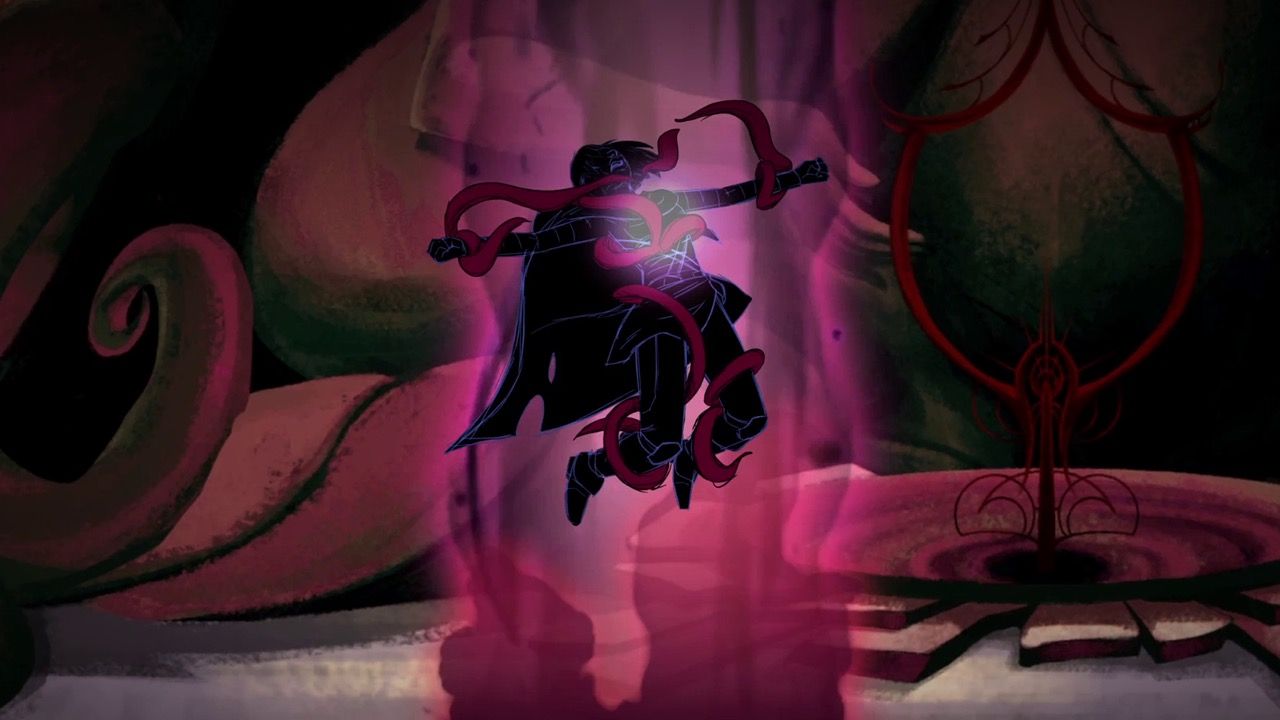Today, developer Thunder Lotus Games released the second trailer for its hand-drawn metroidvania style game Sundered, which was announced back in September.
In addition to the new trailer, which reveals the third region in the game, Eschaton City, the developer also took to the PlayStation Blog to flesh out the game.
For those of you who don't know, Sundered is a "horrifying fight for survival and sanity." Specifically, it's a replayable Metroidvania where you you play as Eshe, a wanderer of a ruined world, who is trapped in ever-changing caverns that are filled with hordes of eldritch horrors. Through the game, you'll be able to harness the power of corrupted relics that you will then use to defeat "powerful and enormous bosses." The kicker is you will need to balance the use of these relics if you want to resist the ancient eldritch powers, or not if you want to embrace them and corrupt your humanity with madness and power. Lastly, the game has multiple ending, however, how different the endings are (or how many there are) is still unknown.
As for the gameplay, Sundered's core game loops revolves around exploring a procedurally generated dungeon, collecting shards, while also fighting "hordes of dynamically spawned enemies." When you die, you're brought back to the central Hub, which is also where you can spend the shards you collect in the Skill Tree.
As mentioned above, Thunder Lotus Games, via Creative Director William Dubé, took to PlayStation Blog to not only reveal news details about the game, but to further flesh out previously announced details. Dubé writes:
When we announced Sundered, many players argued that a Metroidvania could not be procedural. We respectfully disagree. Every time you die, the physical rooms in the dungeon are re-shuffled. Though the overall structure of the world is set in stone, subsections take a random sampling of preset rooms and assembles them to create a different flow every time. Think of it like Diablo 2, where the progression of the levels is always the same, but the individual tiles are always different. This allows us to make design choices which are core to a Metroidvania experience like backtracking and unlocking new abilities that unlock new regions.
Dubé goes on to say that the team's goal was to create monsters that were unpredictable, and to create a feeling that "madness is just around the corner." And in order to achieve this they created monster spawns that are dynamic. The example Dubé gives is Left 4 Dead, where monster spawns are based on a number of factors like time, stress level, current region, etc. All of this according to the developer creates a "multiplicative layer of uncertainty" on top of the randomness of the dungeons.
Dubé then shifts focus to the game's Shards collecting feature, which you can find and collect in the game's dungeons. As mentioned above, when you die, you respawn in the Hub, "the world's central landmark." It is in this Hub you can find the Skill Tree, which is filled with upgrades, perks, and Metroidvania-style abilities. You then spend your Shards on upgrades like permanent stat boosting nodes like Health, Melee Damage and Critical Chance. Or you can spend them on perks, which are just gameplay-changing modifiers. You find perks in the world, but can only equip them in the Skill Tree. Perks are said to vary in power, and a majority of them come with a downside to accompany their upside.
Dubé then goes on to talk about the game's abilities, "the core of player progression." Abilities are found at Shrines in the world and "are the real game changers." Once an ability is found, it appears in the Skill Tree, and unlocks a whole new branch of upgrades.
He adds:
This brings us to Sundered’s catch phrase: Resist or Embrace. The Abilities can be corrupted. After defeating a boss, you receive an Elder Shard. This special relic can be brought to a Skill Shrine on the world to corrupt a specific Ability. A Corrupted Ability is a much more powerful version of the same gameplay mechanic, but it comes at a cost to your humanity. Corrupting an Ability has consequences on game mechanics, as you become more powerful, but has repercussions on the story and the game’s ending, as hinted to in the Embrace trailer
Dubé concludes the information dump by pointing out that Sundered is much more mechanically complex than its previous game, Jotun, and that so far the response to the game "has been great."
Sundered is slated to release on PlayStation 4, and PC sometime in 2017. Below, you can check out the new trailer, as well as some new screenshots:

